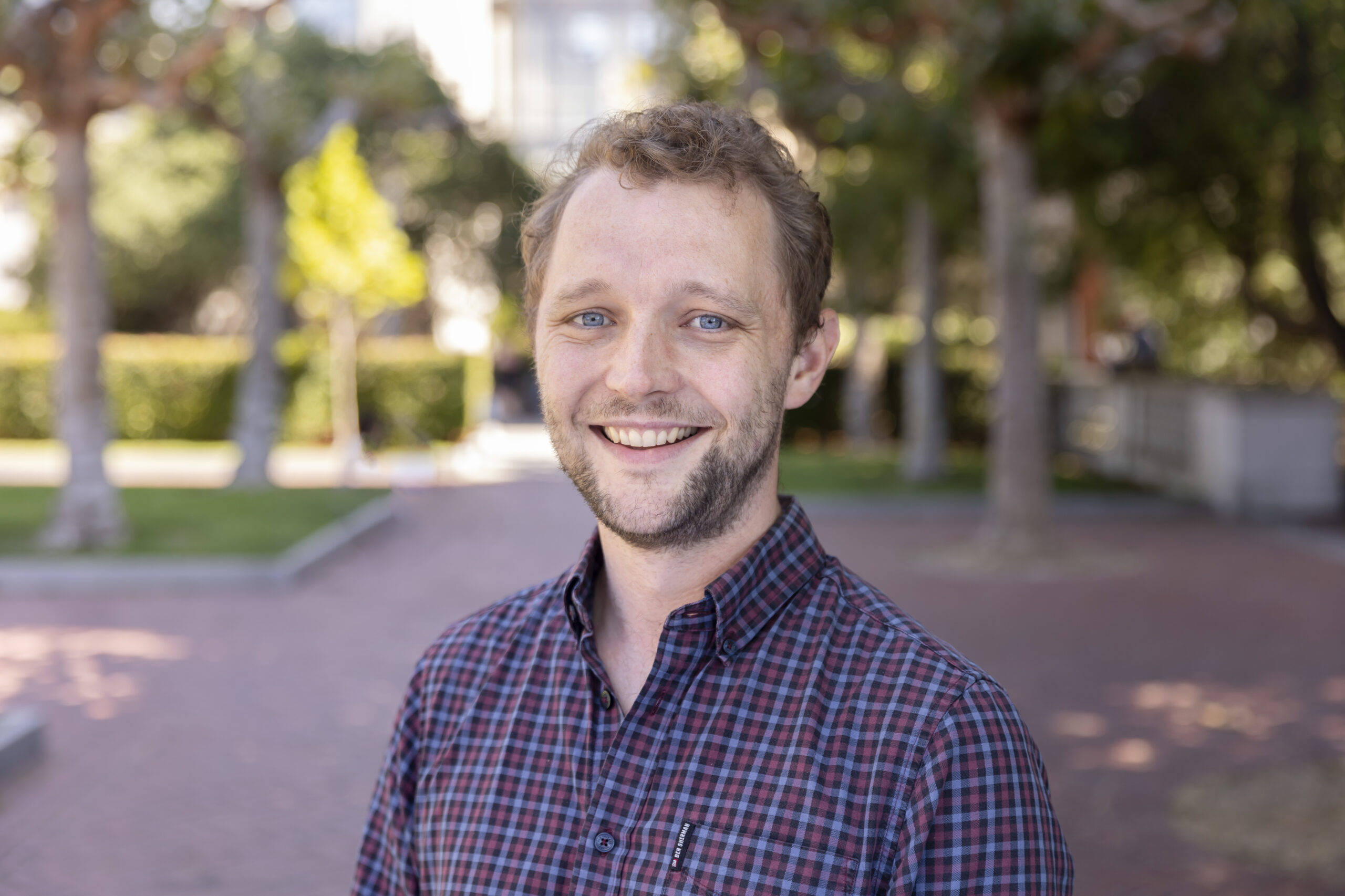
Ben Williams
Plant and Microbial BiologyDr. Ben Williams is an Assistant Professor in the Department of Plant and Microbial Biology at UC Berkeley. The Williams Lab is interested in answering fundamental questions about plant epigenetics. He earned his BA from Oxford University and his PhD from Cambridge University.
Spark Award Project
Ben Williams is seeking to unlock tissue and organ regeneration in engineered & gene edited plants, a complicated process that is currently the biggest bottleneck to crop improvement. Williams proposes to enhance plant regeneration by manipulating enzymes that control cell identity in plants. His ultimate vision is to democratize crop improvement by developing technologies that enhance crop improvement without requiring sophisticated expertise, equipment or expensive materials.
Ben Williams’ Story
A Seed of Hope: Plant Biotechnology and Climate Change Resiliency
By Niki Borghei
October 24, 2023
It’s no secret that climate change is a threat to agricultural health. But with a rapidly growing global population, this threat looms over an already harrowing reality for millions of people: food insecurity. In fact, the United Nations estimates that over 660 million people will suffer from food insecurity in 2030. As temperatures continue to climb and potential harvests succumb to droughts, adapting to climate change is a matter of life and death.
Great challenges, however, create opportunities for great solutions. Ben Williams, Assistant Professor in the Department of Plant & Microbial Biology at UC Berkeley, believes he has found one. Taking inspiration from certain species of plants with an extraordinary ability to regenerate whole organs and tissues, whether naturally or through propagation, he seeks to enable this process in important edible plants.
Q: How do you seek to combat food insecurity with your Bakar project?
A: In order to improve crop efficiency and resilience in the face of climate change, the gene editing and engineering of crop species is likely to be essential. In recent years, there has been incredible progress in making new tools to edit and engineer the genomes of plants. However, progress in plant biotechnology is hindered by a major bottleneck – converting gene edited plant cells into whole plants through tissue and organ regeneration. Many plants possess an
extraordinary ability to regenerate, including several houseplants and horticultural favorites. However, this flexible ability to regenerate organs is missing from most economically important crop species, which currently require time- consuming, expensive and high-tech tissue culture approaches in order to perform even simple gene editing. My lab is hoping to develop new technologies to promote efficient organ regeneration in plants in a manner that is easy to work with and accessible to diverse global communities, including those without access to expensive plant tissue culture facilities.
Q: How would you describe the science behind your solution to someone who is not a scientist?
A: To a non-scientist I would draw the following analogy. Think about a garden plant or houseplant that can be propagated by taking a small cutting, or even an earthworm that can turn into two worms when cut into two. These natural regeneration processes work so seamlessly that little input is required – the regeneration happens as naturally as normal growth and development. Now imagine if we could propagate the most important and valuable plants in the world by similar methods. In a future world where scientists might use CRISPR or other future technologies to create disease-resistant or stress-resilient crops, we would want to regenerate whole plants from those technological breakthroughs as quickly as possible! Currently regenerating them is a very expensive and time-consuming effort, not unlike efforts to regenerate human tissues and organs in petri dishes for regenerative medicine.
Q: What led to your interest in plant regeneration?
A: Two things put me on the path to being excited about it. The first was an experience in graduate school. We were trying to engineer a species that few scientists had worked with intensely before. The process just completely failed at the regeneration step. We had engineered cells, but the sickly little plants were just making a random assortment of tissues that was a kind of Frankenstein-nightmare. It was eye-opening to see some highly qualified and inspiring senior scientists in our department try to solve the problem and be completely stumped. The second experience actually came from gardening and landscaping experiences I had working summer jobs when I was younger. We would attempt to remove invasive species like Japanese knotweed from an area, digging up entire root systems, only for the entire plant to grow back. Later I learnt that these plants (and many others) can regenerate their entire body plan from tiny cuttings. The dichotomy between these successful regenerators and my experience in grad school has puzzled and fascinated me ever since.
Q: What about entrepreneurship?
A: I am naturally drawn to innovation and progress in society, and I really appreciate how places with a lot of young companies and entrepreneurs carry a spirit of optimism that can be hard to find sometimes. I am also drawn to the idea that a few individuals with a great idea can achieve things that large companies with long histories sometimes struggle to do. There is something satisfying about that.
Q: How has the Bakar Fellows Program helped you?
A: The Bakar Spark fund will support my graduate student Kat Smoot who has been very creative and uncovered some very exciting early breakthroughs in addressing the problem we’re motivated to solve. This fund will enable us to do the boldest experiments that would be hard to justify with more risk-averse funding sources.